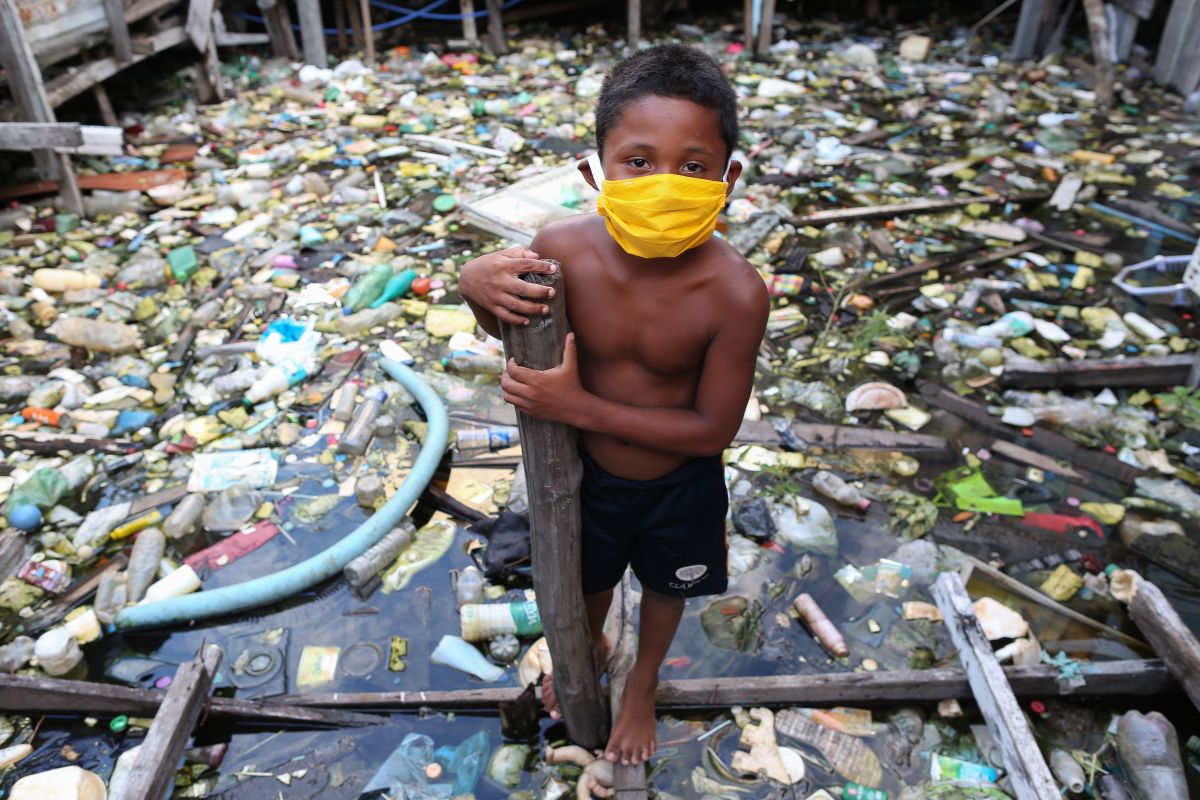My Health My Right the theme for world health day this year
World Health Day is an annual global health awareness campaign celebrated on 7 April, organised by the World Health Organization (WHO).
UNICEF in its statement said, millions of children remain multi-dimensionally poor, meaning they lack access to health care, education, proper nutrition, or adequate housing, often a reflection of inequitable investments by governments in social services.

A boy from the Educandos riverside community wears a face mask during the COVID-19 coronavirus pandemic in Manaus, the Amazon on May 26, 2020. (Photo by MICHAEL DANTAS / AFP)
The economic fallout of the coronavirus pandemic can push children living in poor households across low and middle-income countries by 86 million to reach 672 million by the end of 2020 according to a study conducted jointly by UNICEF and Save the Children organisation.
“The economic fallout of the COVID-19 pandemic could push up to 86 million more children into household poverty by the end of 2020, an increase of 15 per cent,” said the study conducted jointly by the UNICEF and humanitarian organisation Save the Children.
The analysis highlighted that without urgent action to protect families from the financial hardships caused by the pandemic, the total number of children living below the national poverty line in low and middle-income countries could reach 672 million by year-end.
Advertisement
The #COVID19 pandemic could push up to 86m more children into household poverty by the end of 2020. We can’t let this 15% increase happen.
Poverty is not inevitable, we can and must do more #ForEveryChild. @save_children
— UNICEF (@UNICEF) May 28, 2020
Nearly two-thirds of these children live in sub-Saharan Africa and South Asia and countries across Europe and Central Asia could see the most significant increase, up to 44 per cent across the region. Latin America and the Caribbean could see a 22 per cent increase.
“The coronavirus pandemic has triggered an unprecedented socio-economic crisis that is draining resources for families all over the world,” UNICEF Executive Director Henrietta Fore said in a statement.
“The scale and depth of financial hardship among families threatens to roll back years of progress in reducing child poverty and to leave children deprived of essential services. Without concerted action, families barely getting by could be pushed into poverty, and the poorest families could face levels of deprivation that have not been seen for decades,” Fore said.
The organisations warned that the impact of the global economic crisis caused by the pandemic and related containment policies is two-fold — immediate loss of income meant families are less able to afford the basics, including food and water, less likely to access health care or education, and more at risk of child marriage, violence, exploitation and abuse.
Save the Children International CEO Inger Ashing said the “shocking poverty impacts of the COVID-19 pandemic will hit children hard.”
“Children are highly vulnerable to even short periods of hunger and malnutrition – potentially affecting them for their whole life. If we act now and decisively, we can prevent and contain the pandemic threat facing the poorest countries and some of the most vulnerable children. This report should be a wake-up call for the world. Poverty is not inevitable for children,” Inger Ashing said.
The UNICEF press release said, before the pandemic, two-thirds of children worldwide did not have access to any form of social protection, making it impossible for families to withstand financial shocks when they hit and furthering the vicious cycle of intergenerational poverty.
According to the analysis hundreds of millions of children remain multi-dimensionally poor, meaning they lack access to health care, education, proper nutrition, or adequate housing, often a reflection of inequitable investments by governments in social services. The analysis is based on economic projections by the International Monetary Fund and World Bank, historical evidence on past income distribution changes from UNU WIDER, and demographic data from MICS and DHS.
In order to address and mitigate the impact of COVID-19 on children in poor households, Save the Children and the UNICEF call for rapid and large-scale expansion of social protection systems and programmes including cash transfers, school feeding, and child benefits – all critical investments that address immediate financial needs and lay the foundation for countries to prepare for future shocks.
“Governments must also invest in other forms of social protection, fiscal policies, employment, and labour market interventions to support families. This includes expanding universal access to quality healthcare and other services; and investing in family-friendly policies, such as paid leave and childcare,” they said.
The pandemic has so far infected 5,716,570 people and claimed 356,131 lives globally, according to a tally by the Johns Hopkins University.
Advertisement